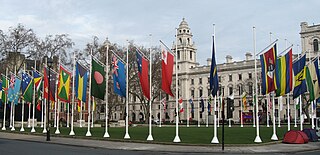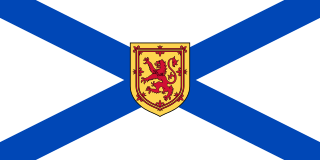
Canada Day, formerly known as Dominion Day, is the national day of Canada. A federal statutory holiday, it celebrates the anniversary of Canadian Confederation which occurred on July 1, 1867, with the passing of the British North America Act, 1867, when the three separate colonies of the United Canadas, Nova Scotia, and New Brunswick were united into a single dominion within the British Empire called Canada.

Lieutenant-General John Graves Simcoe was a British Army general and the first lieutenant governor of Upper Canada from 1791 until 1796 in southern Ontario and the watersheds of Georgian Bay and Lake Superior. He founded York, which is now known as Toronto, and was instrumental in introducing institutions such as courts of law, trial by jury, English common law, freehold land tenure, and also in the abolition of slavery in Upper Canada.

Labour Day is an annual day of celebration of the achievements of workers. It has its origins in the labour union movement, specifically the eight-hour day movement, which advocated eight hours for work, eight hours for recreation, and eight hours for rest.

Victoria Day is a federal Canadian public holiday observed on the last Monday preceding May 25 to honour Queen Victoria, who is known as the "Mother of Confederation". The holiday has existed in Canada since at least 1845, originally on Victoria's natural birthday, May 24. It falls on the Monday between the 18th and the 24th (inclusive) and, so, is always the penultimate Monday of May. Victoria Day is a federal statutory holiday, as well as a holiday in six of Canada's ten provinces and all three of its territories. The holiday has always been a distinctly Canadian observance and continues to be celebrated across the country. It is informally considered the start of the summer season in Canada.

National Indigenous Peoples Day is a day recognizing and celebrating the cultures and contributions of the First Nations, Inuit, and Métis Indigenous peoples of Canada.

Events from the year 1981 in Canada.

Commonwealth Day is the annual celebration of the Commonwealth of Nations, held on the second Monday in March. While the date holds some official status in select member states of the Commonwealth, observances of the date are not uniform across the Commonwealth, and the date is not celebrated as a public holiday in most Commonwealth countries.

The King's Official Birthday is the selected day in most Commonwealth realms on which the birthday of the monarch is officially celebrated in those countries. It does not necessarily correspond to the date of the monarch's actual birth.

Public holidays in Canada, known as statutory holidays, stat holidays, or simply stats, consist of a variety of cultural, nationalistic, and religious holidays that are legislated in Canada at the federal or provincial and territorial levels. While many of these holidays are honoured and acknowledged nationwide, provincial and territorial legislation varies in regard to which are officially recognized.

Emancipation Day is observed in many former European colonies in the Caribbean and areas of the United States on various dates to commemorate the emancipation of slaves of African descent.

Family Day is a public holiday in the countries of: Angola, Israel, Namibia, South Africa, Uruguay, Vanuatu, and Vietnam, in the Canadian provinces of Alberta, British Columbia, New Brunswick, Ontario, and Saskatchewan, in the American states of Arizona and Nevada; and as the second day of Songkran in Thailand. It was formerly observed in the Australian Capital Territory from 2007 to 2017.

Natal Day is a non-statutory holiday in Nova Scotia, Canada, celebrated on the first Monday in August. It coincides with other Civic Holidays across Canada.

The Canadian Automobile Association is a federation of eight regional not-for-profit automobile associations in Canada, founded in 1913. The constituent associations are responsible for providing roadside assistance, auto touring and leisure travel services, insurance services, and member discount programs within their service territories. The CAA National Office in Ottawa coordinates relations between the clubs, oversees joint initiatives, and lobbies the federal government. In 2020 and 2021, the Gustavson Brand Trust Index named CAA the most trusted brand in Canada.
The orders, decorations, and medals of the Canadian provinces, in which each province of Canada has devised a system of orders and other awards to honour residents for actions or deeds that benefit their local community or province, are in turn subsumed within the Canadian honours system. Each province sets its own rules and criteria for eligibility and also for how each award is presented. Most of the awards allow for the recipients to wear their awards in public, and most grant the recipients the use of post-nominal letters after their names. Not all of the awards listed below are part of the Canadian honours system, thus some of them may not be worn or court mounted with awards that are part of the Canadian honours system.

Thanksgiving or Thanksgiving Day, is an annual Canadian holiday held on the second Monday in October. Outside the country, it may be referred to as Canadian Thanksgiving to distinguish it from the American holiday of the same name and related celebrations in other regions.
In Canada, the federal government and all provinces and territories have enacted legislation setting election dates, usually every four years, one year sooner than the constitutionally set five year maximum life of a parliament. However, the governor general, lieutenant governors, and commissioners still have the legal power to call a general election on the advice of the relevant first minister at any point before the fixed date. By-elections, used to fill vacancies in a legislature, are also not affected by fixed election dates.

Labor Day is a federal holiday in the United States celebrated on the first Monday of September to honor and recognize the American labor movement and the works and contributions of laborers to the development and achievements in the United States.
The 2009 Challenge Trophy was contested for in Saskatoon, Saskatchewan from October 7 to 12, 2009. The round robin group seedings were based on last years performance.
In most provinces of Canada, the third Monday in February is observed as a regional statutory holiday, typically known in general as Family Day —though some provinces use their own names, as they celebrate the day for different reasons. The third Monday of February is observed as "Family Day" in the provinces of Alberta, British Columbia (BC), New Brunswick, Ontario, and Saskatchewan; as Louis Riel Day in Manitoba; as Nova Scotia Heritage Day in Nova Scotia; and as Islander Day in Prince Edward Island.

Labour Day is a statutory public holiday in Canada that occurs on the first Monday in September. It is one of several Labour Day celebrations that occur in countries around the world. The Canadian celebration of Labour Day occurs on the same day each year as Labor Day in the United States.
















